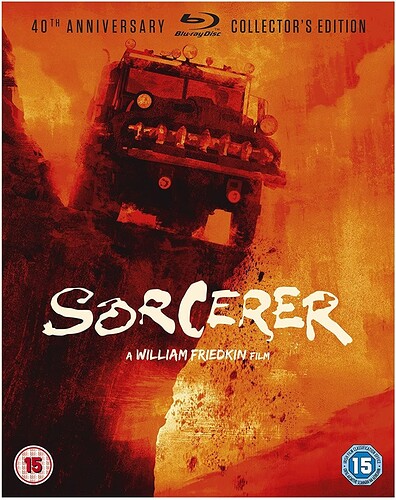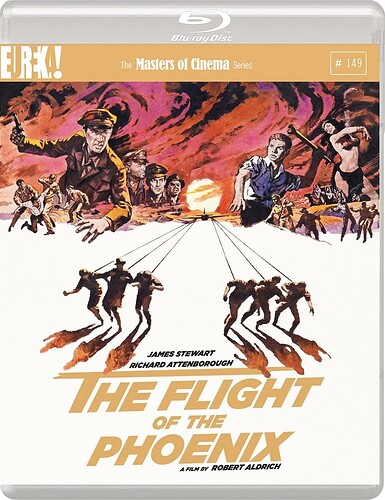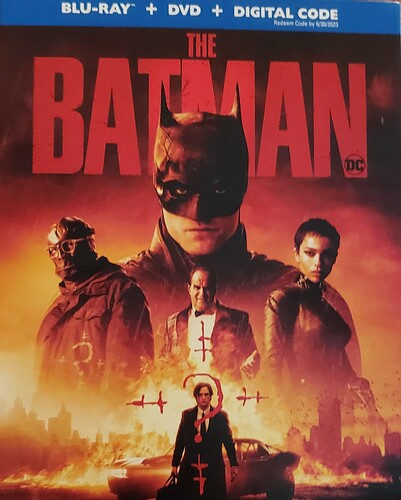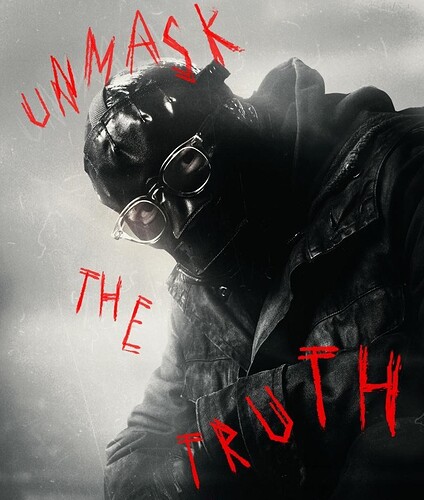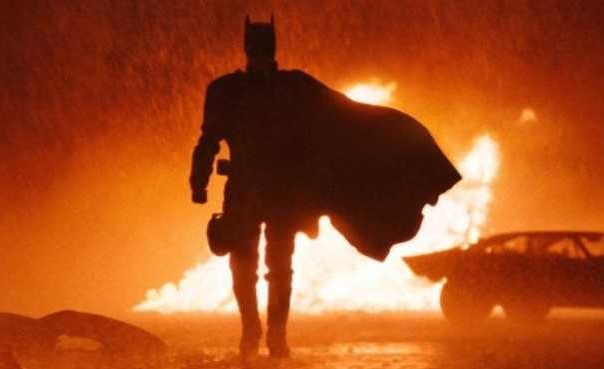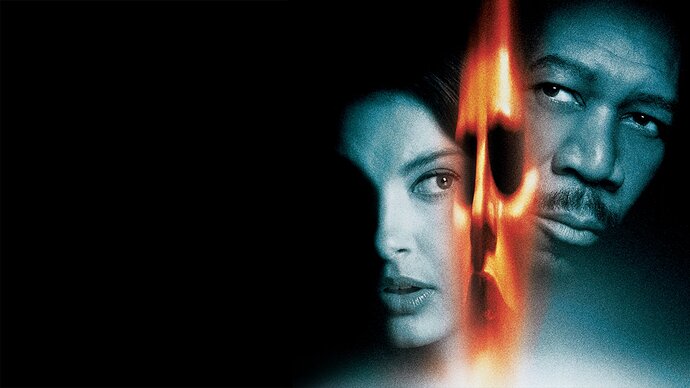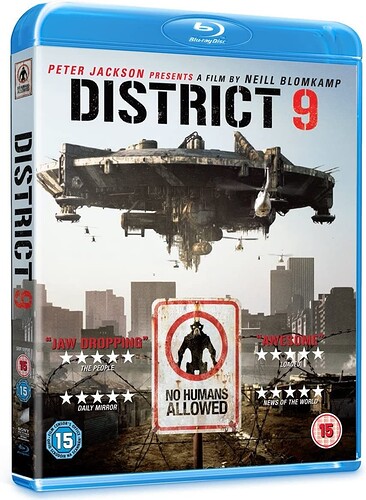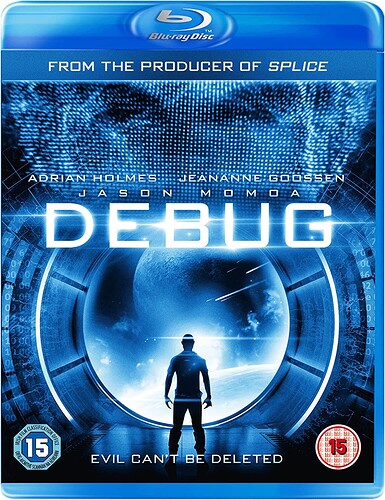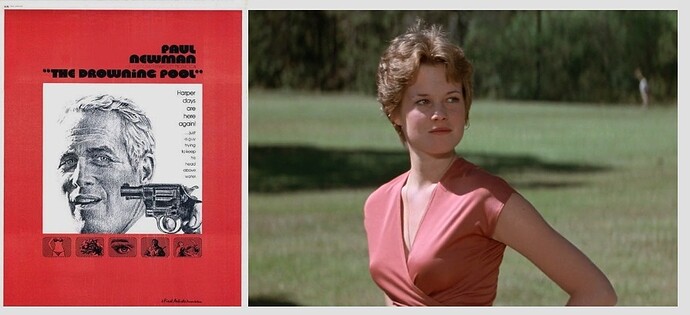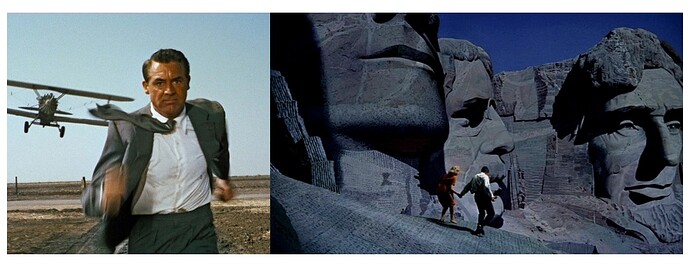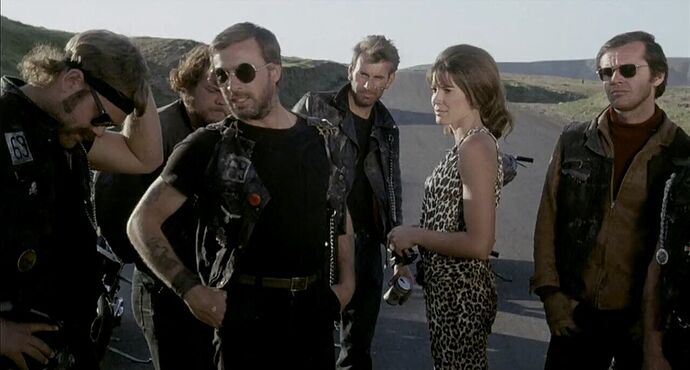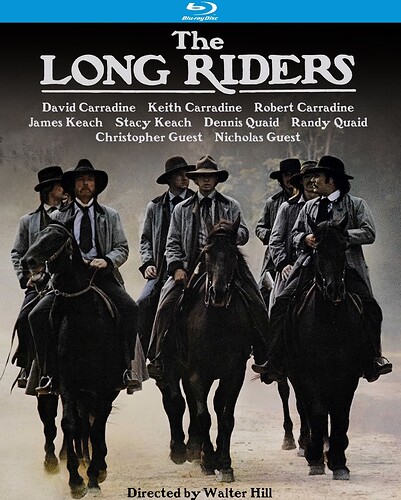Scorpio (1973) - Director: Michael Winner - 7/10 - Film’s primary strength lies in its colorfully depicted characters, grim tone as well as taut storytelling. Instead of introducing a single protagonist and building the entire tale around that, the movie follows its two main heroes simultaneously and alternates between the two narrative strands in order to depict the international world of espionage more thoroughly and in detail; the roles of Lancaster and Delon are complementary in that the contrasting qualities of their parts constitute parts of the same picture or two sides of the same coin so to speak. While the plot as such might not be so extraordinary at a glance, the aforementioned juxtaposition and the dexterity wherewith Winner weaves the storyline certainly inject a lot of energy into the composition; it is a wonder that despite bifurcating on so many occasions, the motion picture still manages to proceed at such a swift pace without feeling rushed or out of focus. Winner succeeds in preserving all the momentum and energy by trimming fat at every possible turn, thereby heightening film’s essence; here this approach most certainly works.
Atout coeur à Tokyo pour OSS 117 (1966) - Director: Michel Boisrond - 4/10 - This is essentially a reformulation of You Only Live Twice with a dash of Thunderball stuff thrown in for good measure; the story is theoretically different, but the basics stay pretty much the same. Though there is no denying that the higher budget ensures an ample number of good looking filming sets, generally decent special effects and good production values all around, all of the aforementioned factors cannot make amends for the utter lack of an element of surprise which in turn induces the flick to remain uniformly platitudinous and unremarkable throughout the running time; consequently, the movie feels too conspicuously flat and derivative to become creatively autonomous in its own endeavors. The direction is fine for the most part, but then again, the riskless craftsmanship evident in the directing also attests to the larger issue with film’s inescapable banality; albeit technically competent, the motion picture too often comes out a little too tidy, too obvious and too simplistic to serve as anything other than a passable, but ultimately forgettable piece of cartoonish entertainment.
No Time to Die (2021) - Director: Cary Joji Fukunaga - 5/10 - This might be the flattest, most flavorless Bond movie to date. Firstly, the movie introduces too many characters and then struggles with resolving all of the narrative strands in a balanced fashion, effecting the bloated running time and composition. Secondly, while cultural settings were never the strong point of Craig’s Bond entries with the exception of Casino Royale perhaps, the cultural context is pretty much non-existent here and as opposed to the best Bond outings of the yesteryear, the film is a cultural wasteland and completely barren of the human factor in this regard, switching between multiple locations in a vapid manner. Thirdly, the motion picture lacks any sense of contrast and doesn’t know how to emphasize the more emotional moments by duly varying its emotive content, which reaches its apogee during the preposterously overdramatized climax. This lacking sense of contrast likewise manifests itself in the visual domain; the cinematography has a noticeably epic sheen to it, but this excessively glitzy, filter-y look promptly grows samey and tiresome on account of the dearth of a proper aesthetic counterpoint. Overall, it is just an oversaturated, overprocessed and overcomplicated pulp of a flick.
Miracle Mile (1988) - Director: Steve De Jarnatt - 9/10 = 9/10 - A re-watch.
Enigma (1982) - Director: Jeannot Szwarc - 6/10.
The Cassandra Crossing (1976) - Director: George P. Cosmatos - 5/10 - Though it is endowed with the impressive, spot-them-all cast consisting of almost everybody, ranging from Burt Lancaster and Martin Sheen through to Lou Castel and Lionel Stander, the remainder of the content, by and large, remains rather formulaic and eventually devolves into your usual 1970s disaster affair. Albeit predictably cheesy and corny, the prefatory characterization turns out mostly agreeable and informs the overall atmosphere with that mellow, old-school charm. The issue is that once things finally get going, it all begins to transfigure into the Towering Inferno or Airport style of flick, except that it’s all set in a train. In other words, very little is left to the imagination, but thankfully, the decent execution by Cosmatos as well as the solid performances given by Sheen, Lancaster and Loren make the motion picture fairly enjoyable and engrossing in the teeth of its evident lack of originality. Nothing exceptional obviously, but it should prove a satisfying enough watch if you’re in the mood for a B-grade 1970s blockbuster.
Conflict (1973) - Director: Jack Gold - 6/10.
Rage (1972) - Director: George C. Scott - 6/10.
The Kremlin Letter (1970) - Director: John Huston - 7/10.
The Lion in Winter (1968) - Director: Anthony Harvey - 8/10.
A Man for All Seasons (1966) - Director: Fred Zinnemann - 8/10.
Licence to Kill (1989) - Director: John Glen - 5/10 → 6/10 - A re-watch.
Blow-Up (1966) - Director: Michelangelo Antonioni - 10/10 → 8/10 - A re-watch.
Max et les ferrailleurs (1971) - Director: Claude Sautet - 7/10 - This one is a bit of a slow-burner all right, but sticking with it all the way is well worth it if you take interest in fully-fledged characterization and good acting as opposed to car chases, shootings and the likes. It is basically a socially-aware crime drama with a fair portion of it dedicated to depicting lives of small-time crooks trying to make ends meet. What makes the motion picture absorbing are good performances by Piccoli, Schneider and Fresson, the cultural setting as well as its relative structural simplicity coupled with leisurely pacing. Not a whole lot happens throughout the movie, but the bountiful character progression as well as intriguing dynamics between the leads make for a gripping watch despite its speciously uneventful nature. The film boasts the meticulous portrayal of tortured souls lost in the urban landscape of Paris and mostly revolves around the internal conflict as well as psychological anguish experienced by its protagonists and thence its primary strength derives. Perhaps too subdued at times, but definitely interesting in its own right.
Missing in Action (1984) - Director: Joseph Zito - 4/10 - While I appreciate the grungy aesthetics, the darker tone as well as the extra 808s, the movie still has too much of that rancid Cannon reek to it; the fact of the matter is that the story is reduced to its barest essentials and could not have been any simpler than that, whereas the rest of the running time is entirely dedicated to action sequences which have a tendency to drag on and dilute the already sparse characterization as well as simplistic story progression. Norris’s amusingly one-note acting range further contributes to the crude appearance of the production and reinforces the trashy feel to a great extent. Though the film comprises some stronger moments, especially its decent shootout at the end and some nice looking stunts in the middle section, the issue consists in the fact that too much of it boils down to the predictably juvenile macho bullshit; the flick eventually comes out way too bland, indistinct and protracted to leave much of an impression in the end. Just your regular, cookie-cutter Cannon piece of trash for the most part.
Endgame - Bronx lotta finale (1983) - Director: Joe D’Amato - 5/10 - While film’s soundtrack constitutes an unabashed rip-off of Vangelis’s Blade Runner, the storyline as such is its own thing in a way; the work in question borrows so many plot devices and ideas from so many different sci-fi classics that it almost turns into an original science fiction melange of its own sort. No matter how entertaining the said eclecticism might be, the visual presentation as well as overall execution turn out to be on the coarse side and make it feel like your regular post-apo romp at the end of the day. Though there are some sporadic moments of inspiration, these get promptly dissipated by flick’s narrative indifference and standard action filler. Likewise, the multitude of purloined concepts eventually comes to distract and detract from the core of the story and as the motion picture works its way through Mad Max shtick, The Omega Man routine, certain Star Wars gimmicks etc., it sort of loses its focus and flavor along the way. All in all, the whole endeavor ultimately feels a bit too over the place, a smidgeon too inchoate as well as tentative in its own creative strivings, constantly introducing seemingly new elements, but without exploring any of them in detail.
Il coltello di ghiaccio (1972) - Director: Umberto Lenzi - 7/10 - Despite Lenzi being at the helm of this giallo outing, the work is a predominantly old-school affair with a fair bit of restraint and coolness to the whole package. However old-fashioned the style here may appear, there is something innately slick about the rendition and truth be told, it is as close as it gets to Lenzi conjuring up a truly chilling atmosphere with less obvious emphasis on action. While Carroll Baker gives a good enough performance, it is Eduardo Fajardo who steals the show as the taciturn chauffeur with ambiguous motives and a frigid gaze. It takes some time before the movie really gets going and introduces some finer details into the equation, but Lenzi’s direction and solid sense of pacing compensate for the relative simplicity of the narrative. Though the flick does not offer much in terms of pure novelty, the way Lenzi constructs the storyline turns out quite gripping and sticking with it all the way is well worth it if you’re willing to condone its slightly stricter stylistic aspirations largely deprived of that 1960s glitz.
Warrior of the Lost World (1984) - Director: David Worth - 3/10 - Considering its virtually plotless nature, the movie holds its own suprisingly well. There is no denying that the flick is a ludicrous trainwreck all the way, with that being said, it tries its damnedest to be entertaining and basically succeeds for the first half an hour or so, pelting its audience with a slew of quasi-phantasmagoric post-apo ridiculousness: black Nazis, Mercedes as well as Opel necklaces, jesting motorbikes, you name it, the outing has got it all. Robert Ginty’s performance here is like a parody of the anti-hero trope in a lot of ways, going all out to come across as the biggest asshole in the entire galaxy, and the motion picture takes on a similarly parodic nature as well. The issue is that things proceed to go downhill following the first thirty minutes; the film thence runs out of ideas, begins to deteriorate and never fully recovers from this downward trajectory. At the very least, the soundtrack by Daniele Patucchi is absolutely badass and all things considered, the offering exhibits a considerable amount of verve in the teeth of its nearly non-existent story. Bad, but not that bad and sorta fun.
Afyon oppio (1972) - Director: Ferdinando Baldi - 5/10 - Even if the characterization does not go beyond the surface level and the narrative is somewhat peripatetic in nature, the motion picture does succeed in supplying a diverting enough piece primarily owing to the gripping performance by Ben Gazzara as well as solid directing by Baldi. Truth be told, the motion picture sort of roves around without much of a scrutiny into any of the things it portrays, that being said, it never strays from the nitty-gritty; Baldi weaves the tale in a predominantly compelling way, adorning the storyline with cultural circumstances which oftentimes prove more interesting than characters themselves. The cultural idiosyncrasies, the energetic performance by Gazzara and the reliable direction by visually capable Baldi ensure that the work stays rather engaging in spite of its intermittently deficient focus, occasionally jerky editing, inadequate outlining of characters and generally curt approach towards the subject matter. It is not without its moments and definitely exhibits a sufficient dose of cohesion, but at the same time, the outing lacks some elaboration, detail and a certain je-ne-sais-quoi to make a lasting impression in the end.
Fenomenal e il tesoro di Tutankamen (1968) - Director: Ruggero Deodato - 2/10 - This is essentially kind of a Fantomas rip-off with a dash of Arsène Lupin thrown in for good measure. Initially, the flick proves somewhat charming in the trashy sort of way; Nicolai’s score is quite jaunty and Gordon Mitchell’s grin always brings a smile to my lips, but following the digestible first half, the narrative goes completely off the rails and turns into an incomprehensible mess of a film. Thereafter, it is nigh on impossible to decipher the abstruse storyline with its impenetrable twists and it is very hard to tell who does what and for what reason. A whole host of poorly introduced characters turn up to push the muddled story forward and get killed only to give way to some more pointless characters doing the same things. Poor staging, paltry storytelling, a paucity of original ideas as well as the non-existent focus in the second half make this one a pretty dreary viewing and firmly establish it as one of the to-be-forgotten pieces of film trash you should definitely steer clear of, there is virtually nothing to take pleasure in here… unless you take delight in pain, that is.
Iron Warrior (1987) - Director: Alfonso Brescia - 4/10 - The first half an hour is pretty much the same as your regular Ator flick which is to say that it has bad acting, an asinine, mediocre story and awful dialogues; the movie, however, gets better after that and what follows makes it worthwhile to sit through the entirety of the film even if it isn’t that good to begin with. The best way to describe the viewing would be to call it a combination of acid and cheese: a large chunk of it is exceedingly cheesy and barely qualifies as coherent in light of its overtly surrealistic imagery; notwithstanding, its overall extravagance, swift pacing and insistence on various editing gimmicks and playful visual touches make it intriguing enough to watch. It is hard to recommend this to anybody on account of the inherent idiocy and chintzy 1980s aesthetics, but it is still somewhat more prepossessing and original than D’Amato’s own take on Ator in that it essays to come up with something resembling a serious, aesthetically autonomous piece of fantasy filmmaking without as much of that helpless, flabby campiness of D’Amato’s originals.
Double Target (1987) - Director: Bruno Mattei - 4/10 - This is some pretty odd material. The basic premise turns out legitimately good and the first thirty minutes happen to be pretty much faultless, nevertheless, the movie thenceforth begins to deteriorate and devolve into your usual action cheesecake with much of its storyline remaining severely underdeveloped in the characterization, e.g. the relation between the father and the son stays completely unexplored. Other than the amicable part of the Belgian mercenary, the work constitutes a pretty unremarkable actioner, with that being said, it still feels like a relative step up from the regular Mattei dross in that it occasionally displays flashes of inspiration and intermittently supplies something more than mere action filler. Regrettably, the story grows totally ramshackle and trashy towards the end, becoming the opposite of the rather enjoyable prologue. This is evidently nothing grand or exceptional by any means, but it’s not that awful and at the end of the day, you could probably do a lot worse than this as far as Italian Rambo rip-offs are concerned.
Napoli spara! (1977) - Director: Mario Caiano - 5/10 - No matter how engrossing and reflective of the contemporaneous socioeconomic situation the presented action might be, there is no disguising the fact that the main storyline is severely lacking in focus and feels like an afterthought for the most part, taking a backseat to shootings and rambunctious car chases, from one robbery to another. The story liberally switches between multiple characters and narrative strands with little regard for overall cohesion and most of the content here basically boils down to freewheeling exploitative filmmaking; indeed, the general plot essentially constitutes a pretext to showcase the anarchy and lawlessness of the times and while it may not be enough to flesh out the entirety of the tale to a satisfactory degree, the overall ferocity and the swift pacing manage to keep the flick engaging and maintain the momentum until the gloomy ending. It might be structurally a bit too amorphous and chaotic for its own good, but the committed performance by Leonard Mann as well as the well-executed action sequences should prove absorbing enough.
La guerra del ferro: Ironmaster (1983) - Director: Umberto Lenzi - 5/10 - The more primitive side of the narrative works quite well and makes for a legitimately gripping watch, however, it all goes sour the moment it turns into some sort of parable on the nature of power, pontificating on the importance of adhering to one’s values at the time of war and so forth. While there might not be anything particularly bad about its more ambitious goals, the instant the plot progresses into the parabolic phase of the script also marks the point at which the movie undoubtedly starts to get muddled and inert with large chunks of its storyline being dedicated to contrasting the might-makes-right kind of worldview with the usual hippy-dippy bullshit. Albeit completely ahistorical, the segments of the work which are purely about the technological progress and the power issuing therefrom prove a lot more absorbing. Thankfully, the flick also has George Eastman to fall back on and he happens to give a pretty amazing performance as the primordial dood called Vood. Notwithstanding its conspicuous shortcomings, the effort still constitutes one of Lenzi’s more interesting endeavors.
Provincia violenta (1978) - Director: Mario Bianchi - 5/10 - However crude the editing as well as the overall rendition might be at some points, there is no disguising the fact that the low budget and the grimy aesthetics greatly add to the enjoyment and make the film appealingly gritty in nature, thereby enhancing the sleaziness already found in the story. Though none of the poliziotteschi were particularly high budgeted, the budgetary constraints here are very salient; with that being said, the cheapness only adds to the charm and gives it a rather unique flavor. Truth be told, the tale isn’t anything fancy, but film’s strength likewise dwells in its relative simplicity. Even if the narrative bifurcates at a certain point, Bianchi handles this surprisingly well and manages to keep storytelling taut and to the point, resolving both narrative strands in a sensible and effective fashion. Lastly, both Al Cliver and Richard Harrison give a good show and additionally contribute to the tense atmosphere of the flick. One should find this diverting enough as long as they do not mind their polizieschi all’italiana being a little mean and on the cheap side; probably the best Bianchi flick I’ve seen so far.
Razza violenta (1984) - Director: Fernando Di Leo - 4/10 - Though the flick may very well be paced in a compelling manner and feature some memorable characters along the line, the story as such remains severely stunted throughout the second half and generally leaves a lot to be desired if you leave out all the shootouts and explosions. Oddly enough, there is still something fascinating and absorbing about the way the tale unfolds even if most of it stays rather superficial and undercooked; it is entirely due to the solid structure and balanced storytelling that the movie does not go south. While the flick obviously hits a snag in the crisis phase of the script and starts going through the motions as though nonplussed about the way how to wrap up, Di Leo’s prepossessing directing as well as the overall ambiance of its locations make the outing a fun viewing in spite of its outstanding flaws. It is quite similar in style to Killer contro killers released the following year, but feels a tad different on account of its subject matter and the deftly simulated oriental setting in addition to some extra NYC locations at the beginning.
Thor il conquistatore (1983) - Director: Tonino Ricci - 3/10 - It is admittedly watchable, but it is not much beyond that. The biggest issue resides in its shallow directing, perfunctory scripting and a general sense of mediocrity percolating through the composition at large. Ricci’s execution is so flabby and helpless he often relies on voice-over as a literary crutch to account for the mythic component of the narrative when his visuals fall short and are not enough to clarify the situation. Each action scene seems to be shot in one or several takes, presumably to economize on the film roll or to shoot the footage with the least amount of effort, it is hard to tell which it is; as a consequence of this, a lot of the swashbuckling looks just as inanimate and uninspired as the direction itself. Francesco De Masi’s score makes the movie feel a lot older than it really is, but it kind of accords with the utter featurelessness of the rendition. Be that as it may, the film sort of lumbers towards the end and does reach its destination eventually, so you could potentially find something of interest here as long as you are willing to overlook this thoroughgoing stylistic somnolence.
Paranoia (1970) - Director: Umberto Lenzi - 7/10 - The quality of filmmaking might not match the grandeur and the finesse of Argento’s or Fulci’s works, but what it lacks in terms of pure style is compensated by the elegance, balance and tasteful rendition. When reduced to its barest essentials, the plot might not appear anything special, but the way it unfolds and pays due attention to its characters makes for a gripping watch and is clearly intended to underline genre’s playful approach towards the 1960s decadence; the conflux of the aforementioned constituents is additionally seasoned with a great deal of acerbic irony and witty dialogues which greatly animate the composition and provide some extra allure between consecutive turnabouts. The movie is not merely about the usual killings and slashes of the razor: it seems to be more concerned with social games, the ambiguity of interactions and the unpredictability of human character when influenced by emotions as well as unbridled passions, the clash between rational and irrational so to speak. Undoubtedly one of Lenzi’s finest giallo outings.
Un posto ideale per uccidere (1971) - Director: Umberto Lenzi - 4/10 - It starts out intriguing enough, but following the starting point, the movie proceeds to transmute according to the all-too-familiar mold and culminates in the rather trivial finale. It is hard to fault Lenzi’s execution, as he squeezes out of the formula as much as he can, but I cannot say I cared much about any of the characters or found any of them interesting enough to stick with the story all the way. The action is thrilling as always in the case of Lenzi’s filmmaking, but outside of the attractive angles and appealing sets, the motion picture regrettably proves quite illogical at certain junctures and does not have much in the way of character development; the central couple comes out of the tribulation the way they were prior to the whole ordeal and the climax merely highlights the issue with the unvarying characteristics of its male and female lead, who continue to be just as naive and lightheaded as they were before the whole enchilada. Thankfully, the film never really stalls and maintains a steady pacing throughout, so at least it titillates on a very basic level, that being said, it is not bound to make a lasting impression on every viewer as is the case here.
Fieras sin jaula (1971) - Director: Juan Logar - 5/10 - The venture is an odd one for sure; the flick begins as your usual giallo endeavor, painstakingly showcasing Rosalba Neri’s curves and her rolling around on the beach with her lover and whatnot, but then it transforms into an artsy drama of sorts with a good chunk of it being dedicated to flashbacks and character study. The movie utilizes quite a bit of voice-over and theatrical lighting, but considering the stagey nature of the storyline, this injects some variety and spruces up the visual appearance to some extent. The primary problem arguably lies in its overreliance on retrospections which results in the composition being on the fragmented side, being neither here nor there and effectively getting lost in its retrospective ruminations. However feeble the direction might come off at certain points, Curd Jürgens gives a great performance as the tormented husband and the underlying premise is a great one even if it is not exploited entirely. Despite some infirm directing and the somewhat confused structure, the movie is still original enough and features some evocative content, which ranges from some touching moments to some utterly morbid ideas, not something you often see in a movie of this sort.
L’uomo più velenoso del cobra (1971) - Director: Bitto Albertini - 6/10 - If I had known who made this film, I probably would’ve stayed away from this in view of the kind of tortures I had to endure whilst sitting through his Fighters from Ave Maria and Return of Shanghai Joe. Thankfully, I was ignorant of his work on the film and shockingly enough, it turned out to be a supremely gratifying cheapo. While there is no denying that the motion picture is not endowed with any particular depth or sophistication, it works extremely well as a corny, old-school piece of purely commercial entertainment. Apart from the fact that it features some vintage 1970s NYC locations with all their urban grunge as well as some neat looking Kenyan localities, the endeavor moves at a very swift pace and generally unfolds in an exceedingly expeditious, efficient fashion, no fat or any kind of superfluity here, just straight-to-the-point, freewheeling action. George Ardisson is a great leading man, Erika Blanc is excellent as the shady femme fatale and last but not least, Albertini’s execution proves ridiculously taut and unpretentious. Again, don’t expect any bells and whistles here, but if you’re looking for a solidly shaped piece of corny fun, this should do the trick.
Macchie solari (1975) - Director: Armando Crispino - 7/10 - The way the movie plays out is completely different from the kind of stuff you would expect to see in a giallo. Initially, it is quite hard to put your finger on what you are actually watching and how to interpret the things you are seeing; the aforementioned factor as well as the feverishly agitated narrative make for a unique viewing experience. Even if the film eventually settles for the fairly conventional resolution, the simplicity thereof does conclude the storyline in a pretty elegant fashion and the work still manages to retain that confusing, bizarre atmosphere until the very end owing to its sowewhat frenetic focus, montage and pacing. Though the tale ends up being not too dissimilar from other giallo outings on paper, the way the venture approaches the subject matter endows the narrative flow with its own distinct feel and flavor; suffice to say, it is hard to recommend this to anybody purely because of how odd and outlandish it turns out, but if this sounds like your cup of tea, then you just might luck out in the end and be in for a treat. Definitely one of the weirdest gialli I’ve seen.
Spasmo (1974) - Director: Umberto Lenzi - 4/10 - The story as such isn’t bad at all when reduced to its essentials, however, the final product is heavily marred by film’s extraordinary campiness, wonky dialogues and a general sense of ridiculousness pervading the composition at large. Fortunately, the film gets progressively better as it goes on in order to culminate in the original and legitimately poignant climax. It’s been a while since I was this conflicted about any flick; on one hand, the underlying premise and the general idea how to go about it are just right, but on the other hand, there is just so much stupid shit here that it pretty much nullifies all the said potential. What with the direction seemingly aiming for a preposterous mix of tongue-in-cheek gags as well as psychological mystery, one cannot help but wonder whether this amalgam was intended anyhow and if so, why such a foolish creative decision was made to begin with. None of it turns out all that entertaining and the opposites eventually come to cancel each other out. I genuinely fail to see the point of a project which is both so stupid and yet so serious at the same time, but I guess that could be whence part of its appeal comes. What a confusing crapfest.
